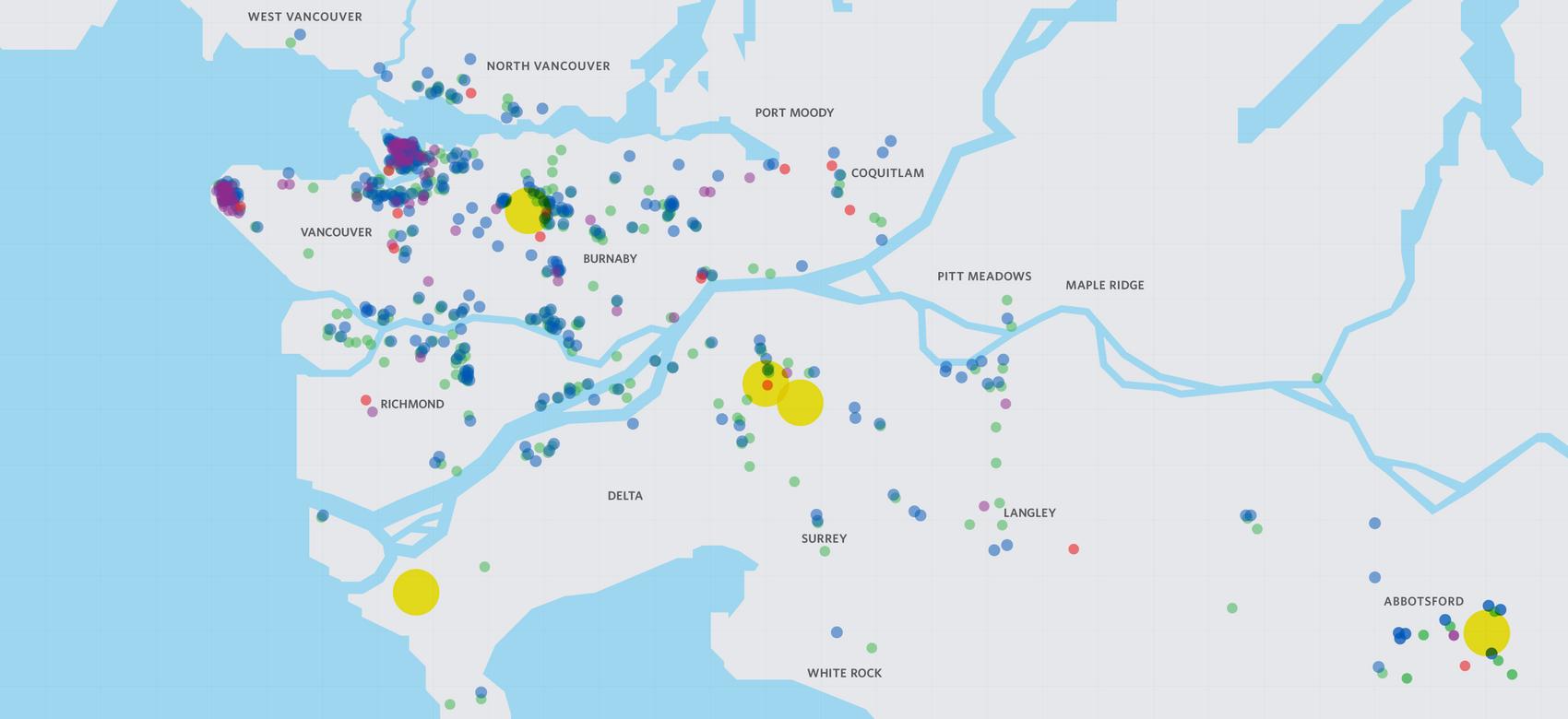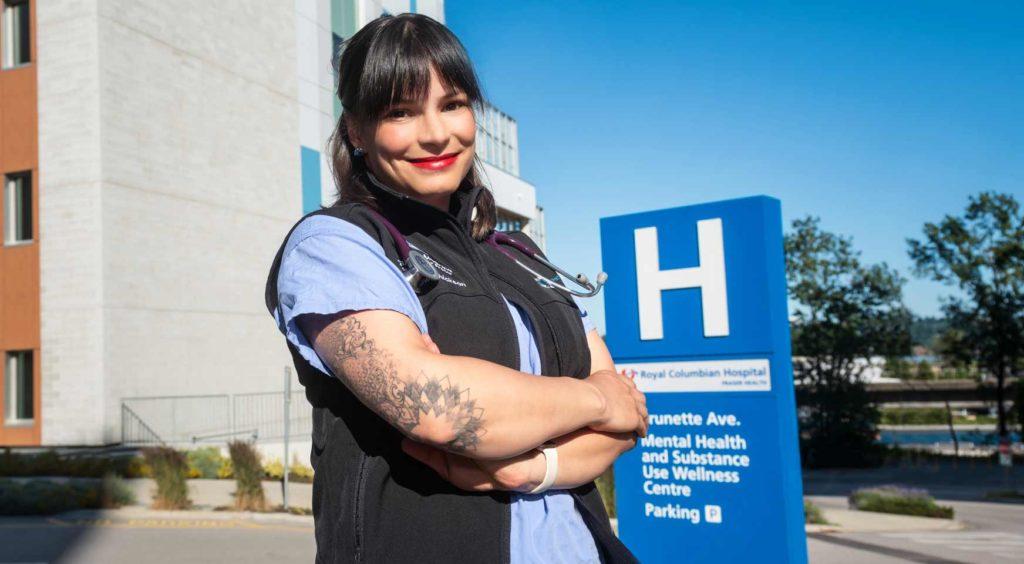Connecting employers with UBC talent
By Julia Waring

Change starts locally. Here’s how UBC students doing on-the-job training are contributing to a diverse workforce across Metro Vancouver and the Fraser Valley.
Like many UBC students, Mona Behrouzian—in her fourth year at the UBC School of Biomedical Engineering—commuted over an hour each way for her recent co-op work term.
Behrouzian was hired as a test engineer for an eight-month term at global medical device manufacturer Verathon Medical in Burnaby. Her job entailed working with the research and development team to perform verification testing on new medical products.
“I learned so many technical and interpersonal skills that are highly transferable for any career, which I could not have learned inside the classroom,” says Behrouzian. “The experience helped me decide the type of career I’d like to have, and whether I want to work in industry or academia.”
Behrouzian, who lives in Vancouver, says the chance to gain work experience with a company known for manufacturing medical devices that have saved many lives during the COVID-19 pandemic ultimately won out over other options with shorter commutes.
Her experience highlights how regional connectivity plays an important role in linking employers with skilled and talented employees through UBC’s professional training programs. Initiatives to enhance regional connectivity, including an expanded public transit system, would allow more students to access unique on-the-job training offered by employers across the region and make an impact in Metro Vancouver communities.
UBC job training in the Lower Mainland at a glance
Every year, thousands of students are hired by employers across the region through co-op programs, internships, work placements and other professional training initiatives. From developing the next generation of doctors and teachers to nurturing new talent for Vancouver’s growing tech sector, UBC plays a central role in meeting current and future needs for a well-educated and diverse workforce.

Commerce co-op student brings business skills to Delta farm
For Cheryl Meng, a fourth-year student at the UBC Sauder School of Business, working as an accounting intern at local family-owned and -operated Windset Farms in Delta was an opportunity to take skills she developed in the classroom into a real-world setting.
“Participating in a co-op allows you to test out your knowledge and be able to apply it in a real business environment,” says Meng. “By talking with my co-workers, I also learned about different opportunities and paths that I can go down with my accounting specialization, which I am excited to explore in future work terms.”
“As someone who has grown up in Surrey, I have a connection with the local community.”
Dr. Parmveer Brar, Emergency Medicine Physician, Surrey Memorial Hospital
Meeting the health-care needs of Metro Vancouver
Every year more than 26,500 UBC student and resident rotations take place in hospitals, primary care settings and clinics in Vancouver and communities south of the Fraser River. Learners train alongside UBC clinical faculty in areas such as family practice, emergency medicine, psychiatry, midwifery and physical therapy.
Dr. Parmveer Brar was one of those residents. Like many doctors who practise in the communities where they trained, Dr. Brar is currently an Emergency Medicine Physician at Surrey Memorial Hospital.
“As someone who has grown up in Surrey, I have a connection with the local community and its resources,” says Dr. Brar. “I understand the environment and I am able to relate to the challenges that are present. I want to give back to the community that has given so much to me.”
Jess Knowles’s experience training in Surrey also inspired her to practise there after graduating from UBC’s midwifery program. She co-owns Modern Midwifery in Surrey and North Delta, and also practises at Surrey Memorial and Peace Arch hospitals.
“Surrey Memorial Hospital was a fantastic, collegial place to work. Midwifery is well integrated with the health-care team,” says Knowles. “The area needs more midwives, and I wanted to help bridge that gap.”
Helping the City of Abbotsford retain First Nations records
During a work term with the City of Abbotsford in Records Management, Arika Kaneko—a third-year student in the School of Information—helped with the city’s records-management policies and procedures.
Like many students, Kaneko doesn’t have a driver’s license and uses transit to get around. To take advantage of this career-building opportunity, she temporally relocated to Abbotsford to be closer to her employer.
While there, she took the initiative to negotiate an extension of the city’s retention schedules of First Nations agreements and protocols to aid in future reconciliation efforts, which helped spark her interest in this field.
“This experience has helped me enhance my skills and understanding of the field,” says Kaneko. “As a records-management project assistant at the First Nations Public Service Secretariat, I am now configuring a new system to manage electronic records and ensure record reliability.”
UBC students like these have a meaningful impact on the communities in which they train. They are the future engineers who maintain our public infrastructure, the resident doctors who help staff our emergency rooms, and the talent who help our film industry thrive.
In the coming decades, Metro Vancouver will grow by more than one million people and over 500,000 jobs. As the region grows, connecting UBC students to employers across Metro Vancouver will become even more crucial for developing the skilled and talented workforce that contributes to our economic prosperity and wellbeing.
Julia Waring is a freelance writer for UBC Campus and Community Planning.
Feel free to republish the text of this article, but please follow our guidelines for attribution and seek any necessary permissions before doing so. Please note that images are not included in this blanket licence.


